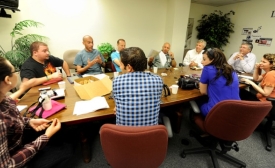libya
Elizabeth Dibble, his colleague at the State Department, spoke about Stevens’ unique diplomatic style. “It takes a lot of tea,” she said. “You don’t rush into talking points, you develop a relationship and a personal connection, and a series of connections becomes a network.”
“The death of U.S. public diplomacy” was how one Twitter user last Tuesday described the now-infamous apology from the U.S. embassy in Cairo for the ill-conceived movie Innocence of Muslims. Strong words, but there is no doubt about it: The need for American public diplomacy in the Middle East needs to be rebooted and rethought. But how?
We have all watched with horror the recent events in Libya, which took the life of Ambassador Chris Stevens, our envoy in Tripoli. Americans across our country have shaken their heads in disbelief that a man who devoted his life to helping Libyans achieve their freedom should have been viciously murdered in the very city he helped protect.
The last time I saw Chris Stevens was in May, at his swearing-in ceremony for his first post as ambassador, in Libya. We'd been friends since he was a junior diplomat on the Iran desk, when we used to gab for hours about Tehran's cryptic politics. We later met up in Mideast hot spots, from Syria and Saudi Arabia to the Palestinian territories. He always had funny tales about diplomatic mischief.
In one of his last acts as U.S. ambassador to Libya, Chris Stevens put together a group of Libyan journalists and sent them to the U.S. on a tour of media outlets. A day after receiving news that their friend Stevens was killed by protesters at the U.S. Consulate in Benghazi, the group of seven Libyan reporters and other media professionals visited this newspaper to exchange ideas about journalism in the U.S.

The USC Center on Public Diplomacy and the International Visitor Leadership Program hosted a small round-table conversation about public diplomacy and the role of journalism in post-Gaddafi Libya with a group of seven Libyan reporters and media professionals.
Dozens of disappointing Pew polls later, with the United States government having earmarked vast sums of money for public diplomacy, you have to wonder whether Washington hasn’t run up a blind alley in its desire to be popular among Arabs. An obscure Israeli-American real estate developer in California uploads a video condemning the Prophet Mohammad, and mobs storm the American consulate in Benghazi, killing an ambassador.
On the heels of Tuesday's deadly attack on the U.S. Consulate in Benghazi, Libya, protesters took to the streets of Tripoli to offer condolences for the death of U.S. Ambassador Chris Stevens and express their disapproval of the protests against a film that demonstrators deemed blasphemous to the Prophet Muhammad.







